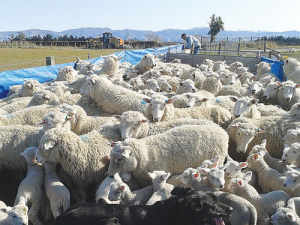Getting sheep shape at Pyramid Farm
The vineyards at Pyramid Farm in Marlborough’s Avon Valley have never been run of the mill, with plantings that follow the natural contours of the land, 250 metres above sea level.
 Australian research has found that a calm temperament in ewes improves both ovulation rate and more successful pregnancies.
Australian research has found that a calm temperament in ewes improves both ovulation rate and more successful pregnancies.
A calm temperament in ewes improves ovulation rate and successful pregnancies, according to a study published by The University of Western Australia (UWA).
The study involved researchers from Uruguay, Australia’s Department of Primary Industries, Regional Development WA and the university.
They investigated the reproductive outcomes of 200 Merino ewes known to have either a calm or a nervous temperament. They found the ovulation rate and rate of successful pregnancies to be higher in the calm ewes.
Associate professor Dominique Blache from UWA’s School of Agriculture and Environment and Institute of Agriculture who led the study said temperament affects ovulation rate but not the occurrence of ovulation.
“Differences in reproductive outcomes between the calm and nervous ewes were mainly due to a higher ovulation rate in calm ewes,” she said.
“Even when the ovulation rate is maintained, some of the nervous ewes have problems in maintaining their pregnancy possibly because of the quality of the eggs and subsequent embryos, and perhaps the quality of the uterine environment during the first two weeks of pregnancy.”
The researchers say understanding why the reproductive outcome of these ewes is different will help to breed sheep better suited for the production system and improve their welfare.
The study found that behavioural reactivity affects ovulation rate, but not the occurrence of ovulation. Therefore, any differences in reproductive outcomes between the calm and nervous ewes were mainly due to a higher ovulation rate in calm ewes.
It also discovered that some of the nervous ewes, when the ovulation rate is maintained, have problems in maintaining their pregnancy. This is possibly because of the quality of the oocytes and subsequent embryos, and perhaps the quality of the uterine environment during the first two weeks of pregnancy.
As plasma concentrations of progesterone post-AI were not affected by temperament, but insulin and leptin concentrations were, the researchers suggest that reproduction in nervous ewes is compromised by factors leading up to ovulation and conception, or in the uterine environment during early pregnancy – that reflect differences in energy utilisation.
The paper, Calm Merino ewes have a higher ovulation rate and more multiple pregnancies than nervous ewes was published in the journal Animal. The research was supported by Meat and Livestock Australia.
The National Wild Goat Hunting Competition has removed 33,418 wild goats over the past three years.
New Zealand needs a new healthcare model to address rising rates of obesity in rural communities, with the current system leaving many patients unable to access effective treatment or long-term support, warn GPs.
Southland farmers are being urged to put safety first, following a spike in tip offs about risky handling of wind-damaged trees
Third-generation Ashburton dairy farmers TJ and Mark Stewart are no strangers to adapting and evolving.
When American retail giant Cosco came to audit Open Country Dairy’s new butter plant at the Waharoa site and give the green light to supply their American stores, they allowed themselves a week for the exercise.
Fonterra chair Peter McBride says the divestment of Mainland Group is their last significant asset sale and signals the end of structural changes.

OPINION: Your old mate welcomes the proposed changes to local government but notes it drew responses that ranged from the reasonable…
OPINION: A press release from the oxygen thieves running the hot air symposium on climate change, known as COP30, grabbed your…